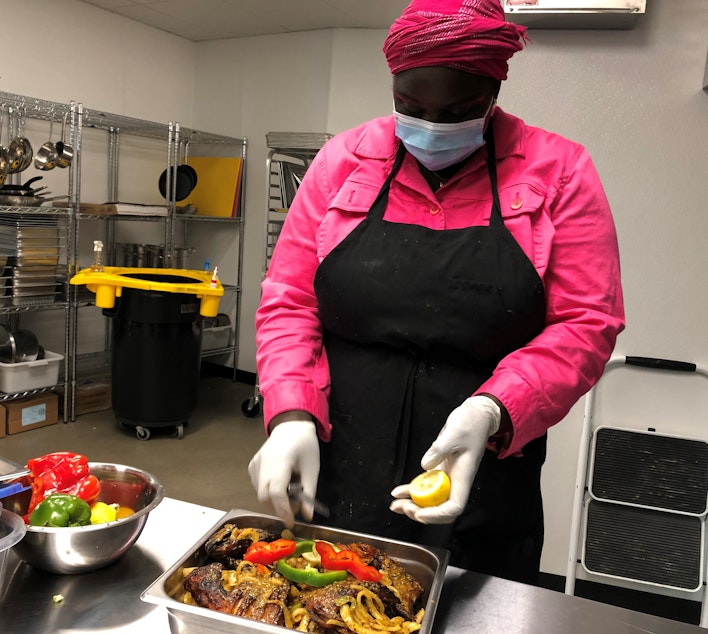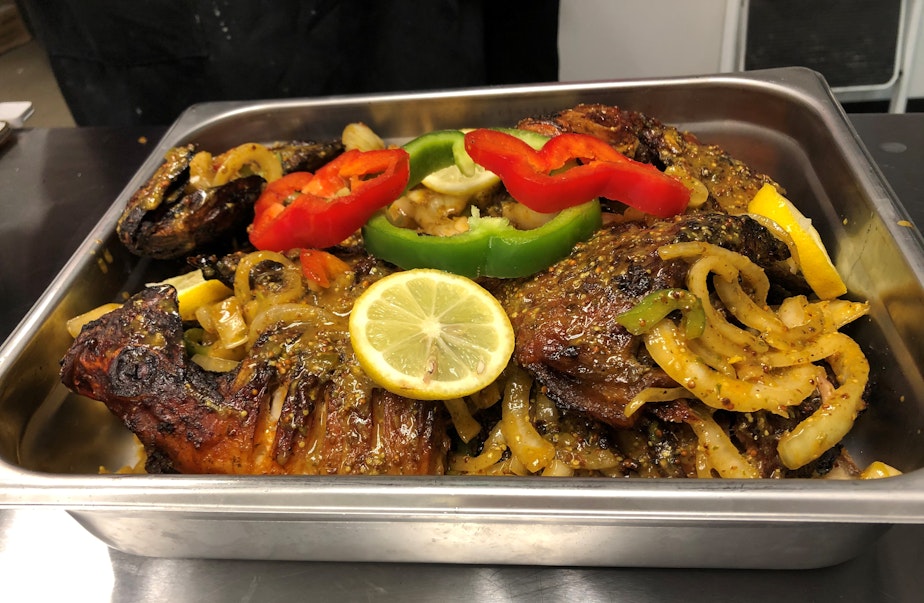New Tukwila food hall opens, featuring global eats

The pandemic has forced many restaurants to close, but a new food hall has opened in Tukwila. And it’s not your typical collection of eateries under one roof.
Here you’ll find Argentinian sweets and Congolese street food. And the women behind these hard to find dishes are immigrants and refugees.
At Spice Bridge Food Hall, Carolline Musitu just brought out a pan out of the oven. Chicken mayo, she explains, is braised chicken mixed with mayonnaise and spices.
“I use nutmeg, bay leaf, white pepper, paprika,” Musitu said.
She transfers the food into a different pan before bringing it out to the food hall. Musitu said this is a typical dish in her home country of Congo, and often eaten with plantains or rice.
“In every corner of the avenue in Congo, in Kinshasa, they making that. It’s very popular.”
The cooking part is easy — she’s cooked for friends or for church dinners. But launching a business was the hard part. She wanted to start her own restaurant and introduce Congolese dishes to the region. But the biggest obstacle by far:
Sponsored
“You have to look for a kitchen, the kitchen was expensive,” said Musitu.
These days, Musitu proudly dishes out chicken mayo, beef stew, and other Congolese favorites at Spice Bridge Food Hall. Here, aspiring entrepreneurs like her receive training and support. The program is part of the Food Innovation Network, a local non-profit that helps women of color start and grow their business.
Program director Kara Martin said based on community outreach, many people have expressed a desire to start a food business, but may not have the know-how or resources to do so.
“What we really try to do is work with the businesses to think through all the things, whether it’s marketing, the food safety requirements… and menu pricing,” Martin said.
In addition to learning the nuts and bolts, the women are paired up with a business coach to help them navigate the process. They’ll have a kiosk at Spice Bridge for up to two years, giving them time and space to fine tune their business plan, and to build their credit before launching.
Starting a small business is hard enough, but the pandemic has complicated things. Like many businesses, they’ve had to shift. In March they started cooking emergency meals every week for seniors and families in need.
Sponsored
Martin said the program’s goal is more than just helping them start a business; it’s also about making culturally appropriate foods available.
“Having access to your cultural foods and how that’s really important to your health and your identity … making that more accessible to the broader community also creates more connection across the community.”
At another station in the kitchen, Oumie Sallah is arranging pieces of grilled fish, topping it with marinated onions and red peppers.

Sponsored
“It’s fish yassa,” said Sallah. “It’s from Gambia, West Africa.”
She developed her love of cooking from her mother, who worked in a hotel for many decades. Together with her sister, Sallah started this business. They both kept their day jobs.
“I am a caregiver at the same time. I’m still doing it.”
It’s her day job, but catering is her dream job.
Nearby, Monica Di Bartolomeo has just finished prepping for tomorrow. She and her husband have always wanted to open a bakery just like the ones they grew up with in Argentina.
Sponsored
“Now we are grandparents and it’s now or never. This a good time to do it for us.”
Whether she’s making empanadas or traditional milk caramel cookies, Di Bartolomeo said she likes to picture the people who will be eating her food.
“So you put all your love in the dough … the reward for me is to see the people smiling.”
For Di Bartolomeo and her cohorts, it’s more than a business. It's also sharing a part of themselves and their culture.




